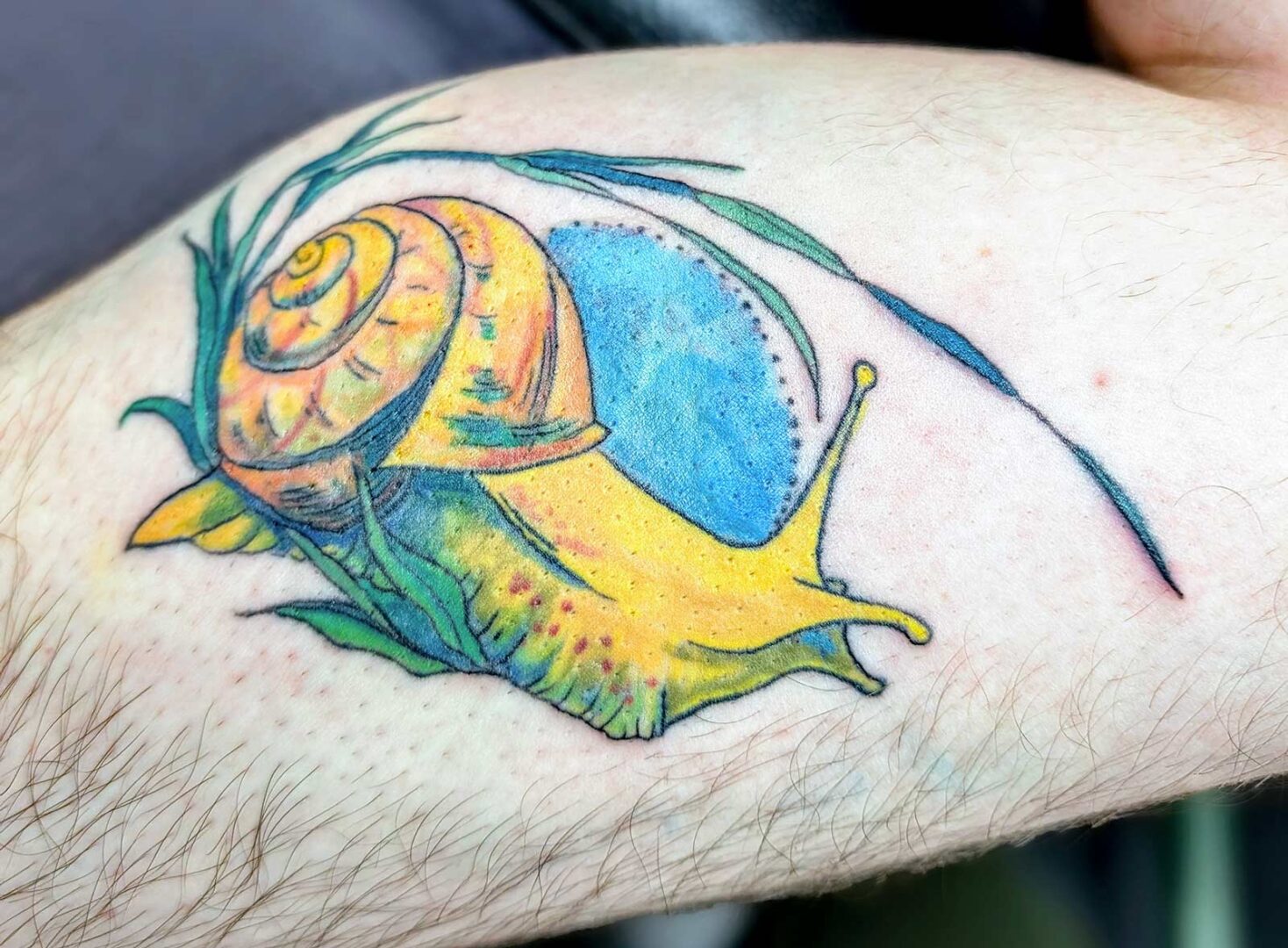Tattooing with Tenderness

Bryce Burton is not the hardened, rugged individual one might expect when picturing a stereotypical tattooist. As an individual and as an artist, Bryce embodies a distinct tenderness and intention. Burton is a trans nonbinary artist, illustrator and self-proclaimed wizard. To them, tattooing is a sacred calling and an extension of their practice of community care. Burton’s practice focuses on helping individuals feel at home in their bodies through intentional placement and design. Burton playfully describes tattooing as “customizing a meat suit.”
Sometimes silly, sometimes serious, but always remarkable, Burton creates unique pieces tailored to each individual. Their style is distinct, combining their fine arts background, lived experience and unique worldview to produce vivid ethereal tattoos and striking black and white images.
Marking a body can be transformative, and it can be a way for trans and nonbinary individuals to transform their bodies. Gender-affirming care looks different for each individual, and for some, it can mean tattoos. Burton considers themself to be a facilitator of adoration, connecting people with their physical form.
Burton works at Jackalope Tattoo in Minneapolis where all artists are of marginalized genders, focused on carving out a safe space in the tattoo world. When they started out in 2020, Burton landed their apprenticeship in Zimmerman, Minn.
“Being an openly trans person in a really small town was interesting. There were the people who really loved me and encouraged me,” Burton recollects. “There were people who really didn’t. That kind of messed up my heart a little bit.”
Burton’s gender identity is intrinsic to their practice, and they consider tattooing “a repossession, reconnection and reclamation of one’s identity and body.”
Working at an urban tattoo shop that aligns with their values has been a refreshing shift for Burton, delving deeper into trans-informed and inspired projects. Burton is unafraid to lean into their softness, exercising vulnerability like a muscle. Their openness allows clients to return it in kind.
“We have the electrical components that are our consciousness, and then we have our little meat interface suit,” Burton explains.
Tattooing can allow an individual to care for their physical body.

“As trans people, we are just distilling ourselves into our truest form,” Bryce expresses. “It’s not something scary or mournful. There’s parts of grief to it, but it’s that transformation process … I think it’s beautiful … I see myself as a facilitator of another person’s truth.”
Burton explained their creative process when clients approach them with an idea, elaborating, “They often give me a little bit of their soul.” With that soul fragment, Burton transforms it into an image, returning to clients saying, “Look what I did with it — I turned it into a flower!”
Burton considers their tattooing a version of gender-affirming care. As a trans person, they know the value of finding home within their body.
“That inherently is a trans process because it’s a transformative process,” Burton says. “It doesn’t always have to do with surgery, because not all trans people have surgeries … Body reclamation is really important to me.”
Burton has found their calling in tattooing, but that doesn’t mean it is without struggle. Tattooing has been a good fit not just because of their art but also because it has allowed Burton the flexibility to listen to their body as they work with a chronic illness. After suffering from burnout in 2023, Burton has made a point to disengage from hustle culture and lean away from oppressive power dynamics.
“For me specifically, tattooing is one of the few work forms I can sustain while being disabled,” Burton says.
Tattooing allows them to create their own schedule and listen to their bodily limitations, sometimes rescheduling sessions. Burton’s disability has given them an unexpected superpower.
“In a way, it has helped other people who are disabled or have different abilities within their bodies,” Burton says, considering the ways their disability has manifested.
In a post-COVID world, Burton is sensitive to health concerns and tries to cultivate as safe an environment as possible.
“Having a safe place for people who are disabled or differently abled is a huge thing,” Burton says. “There are so many places that don’t have good accessibility.”
Burton approaches everything they do with care and intention, and it shows.
Jackalope Tattoo
3753 Cedar Ave. S.
Minneapolis, Minn. 55407
(612) 353-6846
www.jackalopetatoo.com
5200 Willson Road, Suite 316 • Edina, MN 55424
©2025 Lavender Media, Inc.
PICKUP AT ONE OF OUR DISTRIBUTION SITES IS LIMITED TO ONE COPY PER PERSON




